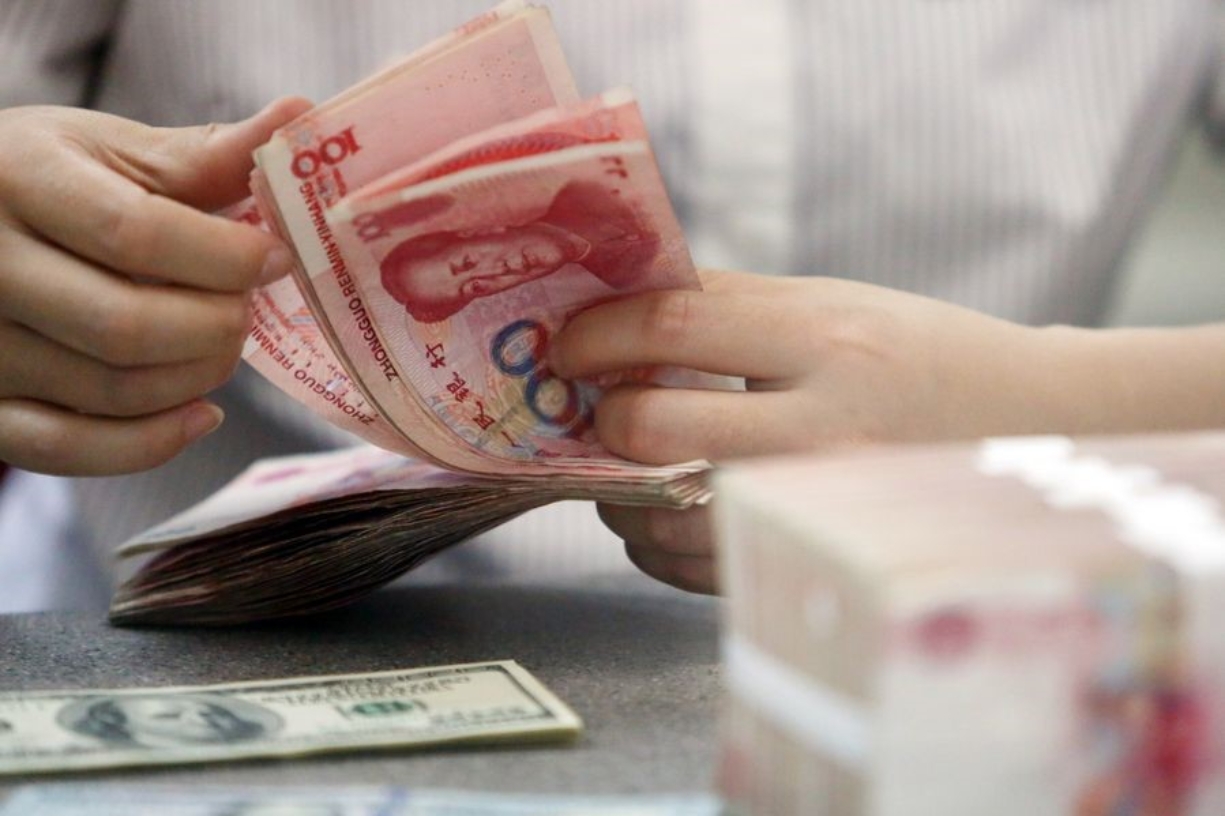[Opinion] Yuan meets all criteria to be a cross-border trade currency

A worker counts Chinese currency renminbi at a bank in Linyi, East China's Shandong province. [Photo/Xinhua]
In his report to the 20th National Congress of the Communist Party of China last year, CPC Central Committee General Secretary Xi Jinping said China will promote the internationalization of the yuan in an orderly way, especially by increasingly using it to settle cross-border trade payments.
Cross-border trade settlement in the yuan has been increasing at a rapid pace since 2015 thanks to the emergence of new trade models and acceleration of the yuan's internationalization process.
China has signed agreements with a number of countries for settling trade payments in the yuan. For example, China and Brazil agreed in March to use their own currencies, instead of the US dollar, for trade settlement, with the People's Bank of China, the country's central bank, signing a memorandum of cooperation with the Central Bank of Brazil to this effect.
Cross-border trade settlement in the yuan has seen rapid growth over the past years, with China inking agreements with Russia, Venezuela, the United Arab Emirates, Oman, Bahrain, Qatar, Kuwait and Saudi Arabia on the subject from 2016 to 2022. While the PBOC has signed bilateral currency swap agreements with more than 40 countries and regions, with a total value of more than 4 trillion yuan ($582.3 billion), the government has authorized 31 yuan-clearing banks in 29 countries and regions to conduct trade in the Chinese currency.
Cross-border trade settlement in the yuan enjoys institutional guarantee, and infrastructure and technological support from the Chinese government, with the central bank issuing a circular last year to promote the yuan's use to settle foreign trade payments in a bid to ensure it better serves the real economy and increases trade and investment.
China also launched the Yuan Cross-border Interbank Payment System, or CIPS, in 2015 in order to build a stable financial infrastructure and a service platform for cross-border yuan settlement. With the aim of reducing transaction costs and processing time, the CIPS has made the yuan's use more efficient and promoted its internationalization. As of February 2023, the CIPS had 1,366 participants — 79 direct participants and 1,287 indirect participants — from 109 countries and regions.
There is a need to promote cross-border yuan settlement to make bilateral trade more efficient and boost the yuan's internationalization process. For example, China was the biggest trading partner of Brazil from 2009 to 2022, and since 2018, bilateral trade has exceeded $100 billion for five consecutive years, reaching $171.49 billion in 2022, an increase of 4.9 percent over 2021. Given that China is the biggest investor in Brazil's energy, minerals, agriculture, infrastructure and manufacturing sectors, the CIPS offers the two sides an alternative to the US dollar to settle trade payments to boost their trade.
The development of the CIPS can hasten the internationalization of the yuan, because if a country mostly conducts foreign trade in its own currency, its currency can become a fully convertible international currency more expeditiously.
According to the General Administration of Customs, China's foreign trade in goods was 42.07 trillion yuan in 2022. Reportedly the yuan's share in global trade financing has risen from less than 2 percent in 2017 to 4.5 percent in 2023. The fact implies that the CIPS will deepen the financial cooperation between China and the rest of the world, and expand the global influence of the Chinese currency.
To be sure, cross-border trade settlement in the yuan will reduce many countries' dependence on the US dollar. Brazilian President Luiz Inacio Lula da Silva said on April 13, during his visit to China, that BRICS member states (Brazil, Russia, India, China and South Africa) should conduct trade in their own currencies.
As a matter of fact, India and Malaysia agreed on April 1 to settle bilateral trade in Indian rupees. And in the ASEAN Financial Ministers and Central Bank Governors meeting in March, member states of the Association of Southeast Asian Nations agreed to promote the use of their currencies in intra-ASEAN trade in a bid to reduce their reliance on the dollar.
The rising "de-dollarization" trend in many parts of the world is a response to the decreasing global influence of the US and its currency — the United States' share of global GDP, based on purchasing power parity, declined from 22.13 percent in 1986 to 15.57 percent in 2022.
Besides, the US Federal Reserve's years-long loose monetary policy has led to record inflation in the US, lowered investors' expectations from US assets, and prompted many countries to look for other currencies to settle foreign trade payments. According to the International Monetary Fund, the dollar's share of international reserve dropped from 71 percent in 1999 to about 58.4 percent in the fourth quarter of 2022. Hence, China should continue to expand the CIPS to help reduce its trading partners' dependence on the greenback.
Also, the US has been using the dollar as a financial weapon to impose sanctions on other countries and regions, dealing a blow to the international financial system. For example, sanctions imposed on Moscow after the Russia-Ukraine conflict broke out have negatively affected emerging economies, even some of the US allies. Therefore, it makes sense for countries to trade in the yuan or other currencies to shield against the "weaponized dollar".
Moreover, the CIPS will also help boost small and medium-sized enterprises, which are the backbone of cross-border e-commerce and need more support from the government to hedge exchange rate risks. And the improvement in cross-border transactions will help improve the financial environment for the SMEs, traditional trade and new trade models, boost the development of foreign trading companies and develop new growth points.
Li Kun is an associate professor at the Business School of Beijing Normal University, and Wei Hao is dean of the Department of International Economy and Trade at the Business School of Beijing Normal University.
https://global.chinadaily.com.cn/a/202305/17/WS646430b9a310b6054fad35d9.html


